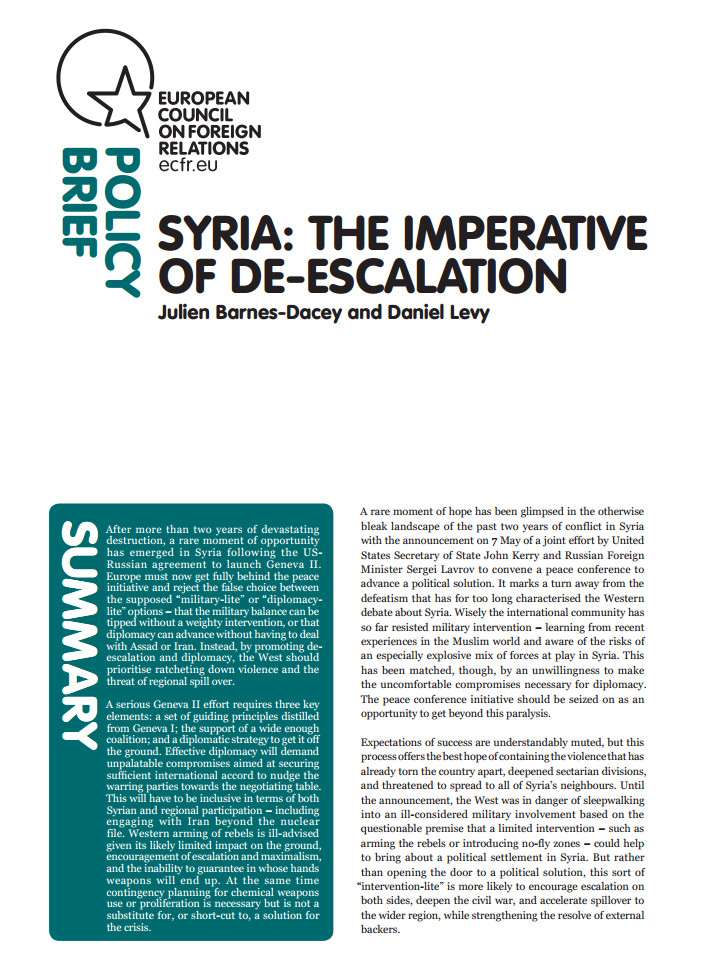Syria: The imperative of de-escalation
A diplomatic strategy for the conflict in Syria
After more than two years of destruction in Syria, a rare moment of opportunity has emerged to renew diplomatic efforts to resolve the conflict. This follows the recent US-Russian agreement to launch Geneva II peace talks.
The West must call time on the make-believe choice between “military-lite” or “diplomacy-lite” solutions – that the military balance can be tipped without a weighty intervention, or that diplomacy can advance without having to deal with Assad or Iran.
There is now a need to acknowledge the difficult choices that prioritising a de-escalation of levels of violence and the reduction of the threat of regional spill-over will entail. Effective diplomacy will demand unpalatable compromises and needs to be inclusive – including engaging Iran (beyond the nuclear file) and accepting that Assad’s fate must be a question for the transition process and not a pre-condition.
A new ECFR policy brief by Julien Barnes-Dacey and Daniel Levy – “Syria: the imperative of de-escalation” – looks at the key issues and questions affecting the success of renewed diplomatic efforts.
- A Geneva II deal will be a difficult and long diplomatic process, but the aim of de-escalating the violence and avoiding the spread of sectarian conflict need to be prioritised above all else. Insistence on Assad’s immediate removal may be morally appealing, but this is not a practical plan. Friends and foes will need to be pushed to the negotiating table.
- Peace will not come quickly to Syria given the on-the-ground polarisation and weaponry, but it is imperative that external actors unite to create a forum for political de-escalation, rather than fanning the flames and pushing Syria and the region deeper into an intractable sectarian conflict.
- Arming the rebels is ill-advised, given the likely limited impact on the ground, the way it would encourage escalation, and the lack of control over whose hands the weapons would end up in.
“De-escalating the conflict in Syria will be messy, difficult, and drawn-out. But if it fails Syria could become a failed state like Somalia, drawing the whole region into violence.” – Julien Barnes-Dacey
“Escalation also risks further disintegration of the Syrian state- increasing the possibility of chemical weapons use by both sides. Planning for chemical weapons scenarios should not be confused with delivering a solution to the overall Syrian crisis, that would be the tail wagging the dog.” – Daniel Levy
Listen to a podcast with Julien Barnes-Dacey:
The Interests of key actors
- Russia: Putin sees the Syria crisis as a symbolic struggle against Western regime change. Moscow’s support for a political solution will be conditioned on a process that is not seen to impose a pro-Western or pro-Islamist solution on Syria.
- Iran: Tehran is Assad’s most important material backer, providing expertise, training, weapons and fighters. Iran wants to defend its regional clout and access to Hezbollah in Lebanon, which it fears could be challenged by a post-Assad Sunni regional order. Iran could, particularly if Russia moves forward, come to accept some form of power-sharing transition in Syria that gives it allies (and so itself) on-going influence.
- Turkey: Turkey has expressed a preference for military action in Syria but will only intervene if a wider international umbrella is in place. But Turkey also sees itself as being the diplomatic avant-garde of the region, which may help to develop a diplomatic solution.
- Saudi Arabia: Despite its strong military support for the rebels in Syria, the Saudis have grown somewhat edgy in reaction to the rise of radical forces in Syria. As the dominant Gulf actor, Riyadh’s support is critical in helping to stop the considerable tide of private money that is flowing into the Syrian opposition.
- Qatar: Doha has emerged as perhaps the least risk-averse actor in the region, and given the efforts it has already made towards dislodging Assad and the very strong links it has developed with the opposition, could be the hardest to persuade to change course.
- Israel: Tel Aviv will not be party to any regional deal, but its opposition to involving Iran in any regional effort will certainly get a sympathetic hearing in Washington and beyond. Israel has limited enthusiasm for a diplomatic process from which it is excluded and Iran included, but is concerned about ungoverned spaces, instability and radical groups on its northern border so there might be some flexibility inside the Israeli security establishment.
The European Council on Foreign Relations does not take collective positions. ECFR publications only represent the views of their individual authors.



